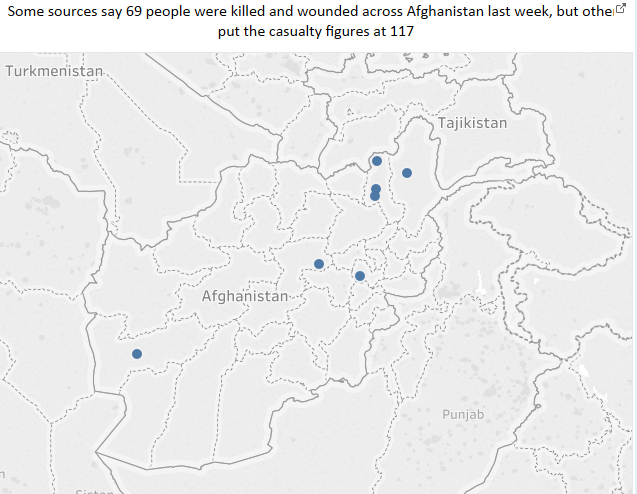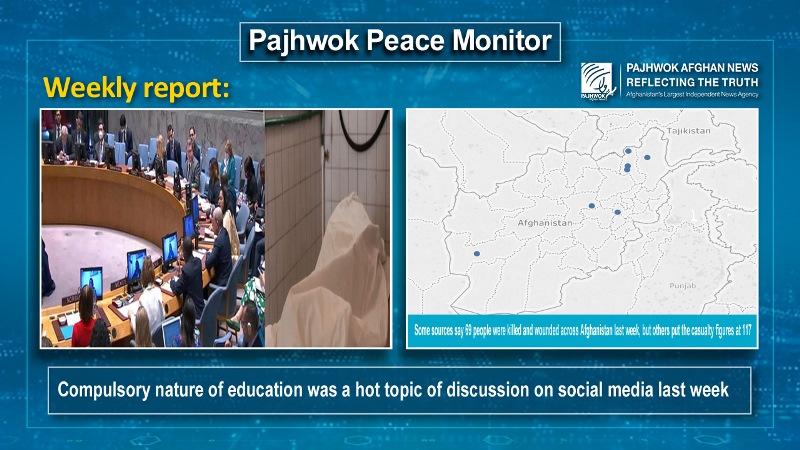KABUL (Pajhwok): Compulsory nature of education was a hot topic of discussion on social media last week, when Afghan officials strongly reacted to Pakistan Prime Minister’s statement regarding the ‘presence of terrorist groups’ in Afghanistan.
Last week’s major events
- Stanikzai: Education is compulsory for men and women
- Hanafi: Worldly knowledge permissible but Amir’s order mandatory
- Shehbaz Sharif: Pakistan worried about terror threats from Afghanistan
- Stanikzai rejects to Sharif’s statement
- Karzai, analysts: Pakistan is center of terrorism
- Pakistan asks US to interact directly with Taliban
- Potzel: Afghanistan to face isolation if does not interact positively with world
- Afghanistan signs interim agreement with Russia to import oil, gas and wheat
- Hekmatyar’s plan: Govt, opposition, Afghan personalities should negotiate crisis
- Casualties
Some sources say 69 people were killed and wounded across Afghanistan last week, but others put the casualty figures at 117
Kabul police said 25 people were killed and 31 others were injured in a suicide attack at Kaaj Education Center in Dasht Barchi area yesterday, but UNAMA put the toll at 35 dead and 82 injured in the attack. One person was killed and three others were injured in a roadside bombing in Badakhshan province and a man was found dead in Farah province.
Security forces killed four armed opponents in Chal district of Takhar province, where unknown gunmen killed a woman in Taluqan, the provincial capital, and killed two people in Darqad district.
The number of casualties is based on reports reaching Pajhwok and the news agency may not have received reports about some incidents or sources have not revealed the exact number of casualties.

In the previous week, 31 people had been killed and 67 others injured in various incidents of violence across the country.
In the past conflict before August 15, 2021, hundreds of civilians and people associated with parties to the conflict would get killed and wounded each week.
Education compulsory
The school year started in March this year but the caretaker government postponed the opening of middle and high schools for girls the same day and said the schools would be opened once a plan in this regard was completed, but gave no timeframe.
Last week, deputy foreign minister Sher Mohammad Abbas Stanikzai said the closing of girls’ schools above sixth grade had created the gap between the people and the government and called for the reopening of girls schools.
“It is very important that education must be provided to all, without any discrimination,” Stanikzai said. “Women must get an education; there is no Islamic prohibition for girls’ education.”
“Let’s not provide opportunities for others to create a gap between the government and people,” he added. “If there are technical issues, that needs to be resolved, and schools for girls must be opened.”
Stanikzai said that the development of a country depended on the education of its people, calling education a duty for men and women.
However, acting minister of vice and virtue Sheikh Muhammad Khalid Hanafi said worldly knowledge was permissible, but the order of the Emir, (Taliban supreme leader) was obligatory.
These statements became a hot topic of discussion on social media and people made various comments about the issue.
Hafizuddin Pirzada wrote: “The knowledge on which a person becomes a Muslim/Momin and fulfills his daily religious obligations is Fardi Ayn and others are Fardi Kifaye.” He said the Prophet (peace be upon him) used the word ‘obligation’ for knowledge.
(The pursuit of knowledge is a duty upon every Muslim.)
Reaction to Shehbaz Sharif’s comments
Last Friday, Pakistan’s Prime Minister Shehbaz Sharif, addressing the 77th annual General Assembly of the United Nations in New York, said his country and the international community were worried about threats from ‘terrorist groups’ in Afghanistan.
He said Islamabad shared concerns with the international community about activities of terrorist groups in Afghanistan such as ISIS, Pakistani Taliban (TTP), Al-Qaeda, East Turkestan Islamic Movement (ETIM) and the Islamic Movement of Uzbekistan (IMU).
However, the Ministry of Foreign Affairs of Afghanistan said the concerns of the United States, Pakistan and some other countries about the threat of terrorism from Afghanistan were baseless and based on incorrect information.
Deputy Foreign Minister Sher Mohammad Abbas Stanikzai, reacting to Shehbaz Sharif’s statement, asked the Pakistani authorities not to further ‘trade’ on Afghanistan in international meetings.
He asked Pakistani officials to avoid defaming Afghans to get a few rupees from the international community.
Former president Hamid Karzai and some Afghan analysts also dismissed Sharif’s statement as baseless and called Pakistan the center of terrorism.
Former ambassador of the Islamic Emirate in Pakistan, Abdul Salam Zaeef, said: “Shehbaz Sharif’s poisonous and false words about Afghanistan indicate a new conspiracy.”
Interaction with the Afghan caretaker government
UN deputy special representative for Afghanistan, Markus Potzel, told the Security Council special meeting that Afghanistan would face isolation if the caretaker government did not interact positively with the international community.
However, the caretaker government of Afghanistan has repeatedly said that it wants a positive interaction with the world in the framework of mutual respect.
US Secretary of State Antony Blinken discussed the latest situation in Afghanistan and the region with his Pakistani counterpart Bilawal Bhutto Zardari.
In a joint press conference with Zardari, Blinken said the common goal of America and Pakistan for the past two decades had been to achieve peace in Afghanistan. He added they still wanted a stable Afghanistan.
Last week, Bilwal asked the international community, especially the United States, to interact directly with the caretaker government of Afghanistan.
The current government of Afghanistan has direct interaction with a number of countries.
Last week, Ministry of Industry and Trade signed an interim agreement with Russia to import oil, gas and wheat.
The agreement includes the purchase of two million tons of oil, five hundred thousand tons of liquefied gas and two million tons of wheat.
Hekmatyar’s plan
Hezb-i-Islami Afghanistan leader Gulbuddin Hekmatyar unveiled a new plan to steer the country out of the current situation.
According to his plan, there should be negotiations between three parties — the current government, armed opponents and personalities in favor of peace and against war.
He said his plan should be accepted to find a peaceful way to the crisis. His plan included creation of a decision-making authority, a constitution and formation of a new government within a year.
ma







GET IN TOUCH
NEWSLETTER
SUGGEST A STORY
PAJHWOK MOBILE APP